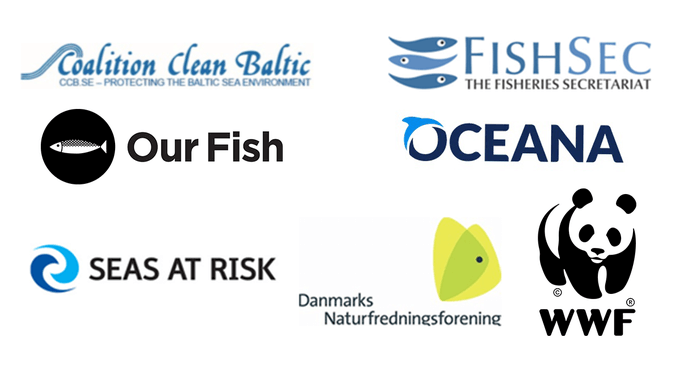Scientific Advice: No improvement for collapsed fish stocks - time for a reboot in the Baltic Sea

Brussels, 1 June 2022: Responding to today’s publication of annual scientific advice for 2023 fishing limits in the Baltic Sea by the International Council for the Exploration of the Sea (ICES), a group of non-governmental organisations said that the Baltic Sea remains in a dire condition, despite tightening of fishing limits in recent years, and that governments in the region must urgently implement precautionary, ecosystem-based fisheries management and boost control and enforcement.
The ICES scientific advice [1] shows no improvements of the Baltic fish populations previously considered as depleted, such as Eastern Baltic cod. Although the two Baltic plaice stocks are abundant, the scientists have given a warning signal that the current management of plaice with just one fishing limit for two populations “could lead to the overexploitation of either stock”. The situation of pelagic species is diverse, with the Gulf of Riga herring population growing, while central Baltic herring remains at a worryingly low level.
ICES advises small increases on three stocks (western Baltic cod, plaice and main basin herring), decreases for three stocks (Bothnian sea herring, sprat and Riga herring) zero TAC on one stock (Eastern cod) and a roll over from last years for the two salmon management areas. One stock, western herring, which is severely depleted, is not included in this advice and will be released at a later stage.
“The scientific advice for fishing limits in the Baltic Sea should teach a tragic lesson to EU fisheries ministers: continued overfishing will have permanent repercussions, that not only destroy the ecosystem’s capacity to function, it will decimate the industry that depends upon it”, said Rebecca Hubbard, Program Director Of Our Fish. “Now is the time for the EU Commission to step up and ensure that all fishing in the Baltic Sea has climate and ecosystem impact assessments, and for Member States to allocate the meagre quota available to those fishers with the least environmental impact and delivers the best social and economic benefits, as Article 17 of the Common Fisheries Policy requires.”
“Today’s advice from ICES confirms that the Baltic Sea ecosystem and the fisheries exploiting it are facing the worst crisis ever. Focusing on recovery, measures like cameras onboard to monitor bycatch and use of the best available selective and low impact gear must be made mandatory if any fishing is to happen in this exhausted and fragile ecosystem. Bottom trawling, with all its negative impacts on habitats, species and climate, has no place in the Baltic Sea anymore and must leave room for low impact fishers and angling”, said Jan Isakson, Director of the Fisheries Secretariat.
“The ICES advice highlights once again that we fundamentally need to change the way we manage our fisheries in the Baltic. Besides setting fishing limits that stay within the scientific advice, the fishery of tomorrow needs to be as climate neutral as possible and fully electronically monitored. Decision makers need to do more to protect vulnerable fish habitats from bottom trawling and adopt an ecosystem based fishery,” said Cathrine Pedersen Schirmer from the Danish Society of Nature Conservation.
“The most positive and concrete approach of the scientific advice and management options presented today is for the Baltic salmon stocks. Closing down harmful fishing on weak and stronger stocks intermixed in the open sea and instead focus fishing closer to rivers of origin and at the same time keep total quota low. This is the most useful advice the ICES released today and other stocks need a similar approach to safeguard subpopulations”, says Nils Höglund, Fisheries Policy Officer at Coalition Clean Baltic.
“In a context of climate and environmental crises, fishing must go from being part of the problem to being part of the solution. The latest scientific advice shows that some of the main Baltic fish populations, including cod, herring, and eel, are overexploited and in a critical conservation state. There is an urgent need for Baltic states to not only set the fishing mortality to sustainable levels and minimise the impacts of fishing in the ecosystem, but also to progress towards an ecosystem-based management system in which fishing contributes to bringing back the good environmental status of the Baltic Sea”, said Javier López, Campaign Director for Sustainable Fisheries at Oceana in Europe.
“The dramatic situation of fish stocks in the Baltic shows clearly that we must adapt our fisheries to the reality of the ecosystem, it doesn’t work the other way around. The focus of the coming years needs to be to rebuild the stocks and to restore the ecosystems”, said Christine Adams, Fisheries Policy Officer at Seas At Risk, adding: “Now the European Commission needs to defend that against short-sighted economic interests of fisheries ministers and guide the way into a future where all fishing in the Baltic is low-impact and low-emission.”
“The new scientific advice for Baltic fish stocks continues to emphasise that sprat is an important forage species for Baltic cod, and that multispecies interactions should be considered when managing the sprat fishery. We therefore recommend that the European Commission and Baltic fisheries ministers continue to set sprat fishing limit below the maximum threshold advised by scientists, as was the decision for 2022. This is a step towards implementation of the ecosystem-based approach to fisheries management, a clear requirement of the Common Fisheries Policy,” said Johanna Fox, Director of the WWF Baltic Ecoregion Programme.
ICES also issues advice on non-quota species of flounder and sea trout. Flounder is concerning as the species is caught predominantly as bycatch, is still legally discarded in large amounts, and health of the multiple stocks are not well known.
[1] ICES ADVICE LINKS
Western Baltic Cod (subdivisions 22-24)
Eastern Baltic Cod (subdivisions 24-32)
Gulf of Bothnia Herring (subdivisions 30 and 31)
Central Baltic Herring (subdivisions 25–29 and 32, excluding the Gulf of Riga)
Gulf of Riga Herring (subdivision 28.1)
Plaice in Kattegat, Belt Seas, and the Sound (subdivisions 21–23)
Plaice in Baltic Sea (excluding the Sound and Belt Seas, subdivisions 24–32)
The ICES advice for Western Spring Spawning Herring (subdivisions 20–24, Skagerrak, Kattegat, and western Baltic) will be released later, together with the advice for the North East Atlantic stocks.
NOTE: NGOs will produce our recommendations for fishing limits for all Baltic fish stocks for 2022 in the coming weeks.
Contacts:
Cathrine Pedersen Schirmer, Senior Marine Policy Officer, The Danish Society for Nature Conservation, Cathrine@dn.dk, +45 31 19 32 26
Christine Adams, Fisheries Policy Officer, Seas At Risk, cadams@seas-at-risk.org, +32 465 52 64 52
Dave Walsh, Communications Advisor, Our Fish, dave@our.fish, +34 691 826 764
Emily Fairless, Communications Officer, Oceana, efairless@oceana.org, +32 (0) 478 038 490
Jan Isakson, Director, FishSec, jan.isakson@fishsec.org, +46 70 608 74 83
Johanna Fox, Director, WWF Baltic Ecoregion Programme, johanna.fox@wwf.se, +46 70 009 05 48
Nils Höglund, Fisheries Policy Officer, Coalition Clean Baltic, nils@ccb.se, +46 708 679249


